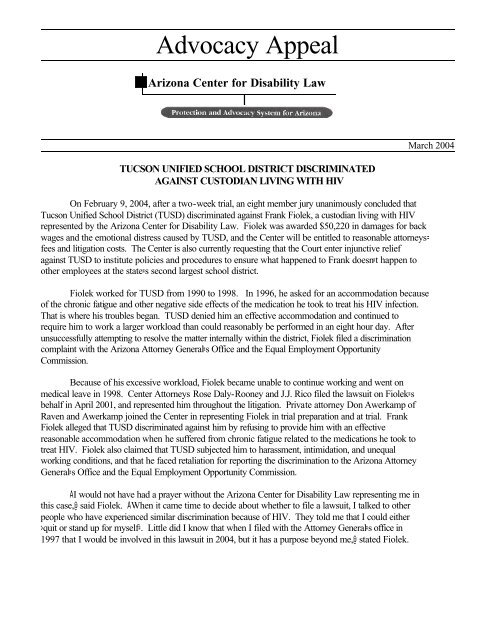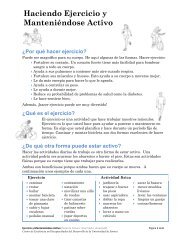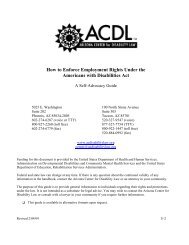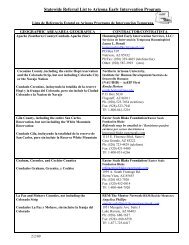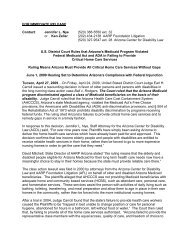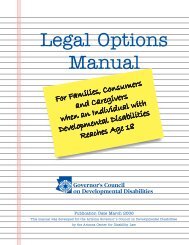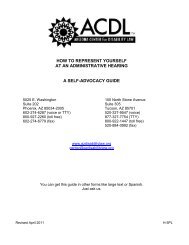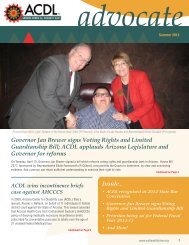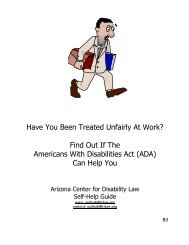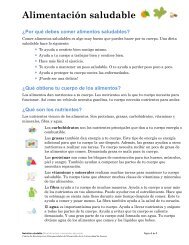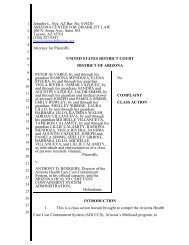Advocacy Appeal - Arizona Center for Disability Law
Advocacy Appeal - Arizona Center for Disability Law
Advocacy Appeal - Arizona Center for Disability Law
Create successful ePaper yourself
Turn your PDF publications into a flip-book with our unique Google optimized e-Paper software.
<strong>Advocacy</strong> <strong>Appeal</strong><br />
<strong>Arizona</strong> <strong>Center</strong> <strong>for</strong> <strong>Disability</strong> <strong>Law</strong><br />
March 2004<br />
TUCSON UNIFIED SCHOOL DISTRICT DISCRIMINATED<br />
AGAINST CUSTODIAN LIVING WITH HIV<br />
On February 9, 2004, after a two-week trial, an eight member jury unanimously concluded that<br />
Tucson Unified School District (TUSD) discriminated against Frank Fiolek, a custodian living with HIV<br />
represented by the <strong>Arizona</strong> <strong>Center</strong> <strong>for</strong> <strong>Disability</strong> <strong>Law</strong>. Fiolek was awarded $50,220 in damages <strong>for</strong> back<br />
wages and the emotional distress caused by TUSD, and the <strong>Center</strong> will be entitled to reasonable attorneys=<br />
fees and litigation costs. The <strong>Center</strong> is also currently requesting that the Court enter injunctive relief<br />
against TUSD to institute policies and procedures to ensure what happened to Frank doesn=t happen to<br />
other employees at the state=s second largest school district.<br />
Fiolek worked <strong>for</strong> TUSD from 1990 to 1998. In 1996, he asked <strong>for</strong> an accommodation because<br />
of the chronic fatigue and other negative side effects of the medication he took to treat his HIV infection.<br />
That is where his troubles began. TUSD denied him an effective accommodation and continued to<br />
require him to work a larger workload than could reasonably be per<strong>for</strong>med in an eight hour day. After<br />
unsuccessfully attempting to resolve the matter internally within the district, Fiolek filed a discrimination<br />
complaint with the <strong>Arizona</strong> Attorney General=s Office and the Equal Employment Opportunity<br />
Commission.<br />
Because of his excessive workload, Fiolek became unable to continue working and went on<br />
medical leave in 1998. <strong>Center</strong> Attorneys Rose Daly-Rooney and J.J. Rico filed the lawsuit on Fiolek=s<br />
behalf in April 2001, and represented him throughout the litigation. Private attorney Don Awerkamp of<br />
Raven and Awerkamp joined the <strong>Center</strong> in representing Fiolek in trial preparation and at trial. Frank<br />
Fiolek alleged that TUSD discriminated against him by refusing to provide him with an effective<br />
reasonable accommodation when he suffered from chronic fatigue related to the medications he took to<br />
treat HIV. Fiolek also claimed that TUSD subjected him to harassment, intimidation, and unequal<br />
working conditions, and that he faced retaliation <strong>for</strong> reporting the discrimination to the <strong>Arizona</strong> Attorney<br />
General=s Office and the Equal Employment Opportunity Commission.<br />
AI would not have had a prayer without the <strong>Arizona</strong> <strong>Center</strong> <strong>for</strong> <strong>Disability</strong> <strong>Law</strong> representing me in<br />
this case,@ said Fiolek. AWhen it came time to decide about whether to file a lawsuit, I talked to other<br />
people who have experienced similar discrimination because of HIV. They told me that I could either<br />
>quit or stand up <strong>for</strong> myself=. Little did I know that when I filed with the Attorney General=s office in<br />
1997 that I would be involved in this lawsuit in 2004, but it has a purpose beyond me,@ stated Fiolek.
March 2004 Page 2 <strong>Advocacy</strong> <strong>Appeal</strong><br />
<strong>Center</strong> Staff work to protect the rights of <strong>Arizona</strong>ns with mental illness<br />
Since its inception, the <strong>Center</strong> has been dedicated to ensuring that persons with mental illness are free<br />
from abuse and neglect and have access to the services and supports they need. Through individual cases,<br />
investigations and systemic re<strong>for</strong>m litigation like Arnold v. Sarn and Jason K. v. Eden, <strong>Center</strong> staff work<br />
hard to make a difference. The federal Protection and <strong>Advocacy</strong> <strong>for</strong> Individuals with Mental Illness Act<br />
provides funding as well as giving the <strong>Center</strong> the authority to obtain records and access to facilities in<br />
order to investigate and monitor conditions. In the last fiscal year, the <strong>Center</strong>:<br />
$ Directly assisted 479 individuals with mental illness.<br />
$ Successfully resolved 131 complaints of abuse, including failure to provide necessary and<br />
appropriate treatment.<br />
$ Advocated <strong>for</strong> community placements <strong>for</strong> 43 individual clients residing in mental health<br />
facilities.<br />
$ Provided assistance on discrimination issues, including housing and employment, <strong>for</strong> 126<br />
individuals.<br />
$ Impacted the lives of 1000s of individuals through the services developed as the result of<br />
the Arnold and Jason K. cases.<br />
In achieving these results, the <strong>Center</strong> depends on an excellent staff with experience, enthusiasm and<br />
sensitivity to the issues. The <strong>Center</strong> is pleased to announce it has added three new members to its mental<br />
health services team within the last month, increasing our ability to respond to the legal needs of people<br />
with mental illness.<br />
Cheryl Koch-Martinez has recently come on board as a staff<br />
attorney on the mental health team. Cheryl will be assisting Senior<br />
Litigation Attorney Anne Ronan on the Arnold v. Sarn case, as well<br />
as working on a variety of mental health services issues. Cheryl<br />
comes to the <strong>Center</strong> with significant experience in poverty law and<br />
child welfare issues having worked as an attorney in Gila River<br />
Indian Community and with Community Legal Services Farm<br />
Workers program.<br />
Carl Roberts joined the staff in February as an In<strong>for</strong>mation and Referral (I & R) and Intake Specialist.<br />
Carl will be the first person most people contacting the <strong>Center</strong> speak to about health care or mental health<br />
legal issues. He will be able to provide resources to those persons calling as well as taking down the<br />
in<strong>for</strong>mation necessary <strong>for</strong> the legal staff to review the case <strong>for</strong> further assistance. Carl comes well<br />
prepared <strong>for</strong> the position, after working the last 3 years as a team leader and peer support specialist at<br />
META and <strong>for</strong> other mental health agencies in the Phoenix area <strong>for</strong> many years.<br />
Peri Jude Radecic will be splitting her time between the mental health and<br />
health care teams, providing representation <strong>for</strong> individuals on appeals in the<br />
AHCCCS system as well as addressing systemic problems in both the<br />
health care and mental health systems. Peri Jude attended law school in<br />
<strong>Arizona</strong>, but most recently was employed by the U.S. Department of<br />
Agriculture in Olympia, Washington as the Equal Employment Specialist<br />
<strong>for</strong> Washington State and Oregon.
March 2004 Page 3 <strong>Advocacy</strong> <strong>Appeal</strong><br />
THE ARIZONA CENTER FOR<br />
DISABILITY LAW AND THE DAVID AND<br />
MINNIE MEYERSON FOUNDATION<br />
ANNOUNCE THE ESTABLISHMENT OF<br />
THE “MEYERSON ADVOCACY<br />
PROJECT”<br />
The <strong>Arizona</strong> <strong>Center</strong> <strong>for</strong> <strong>Disability</strong> <strong>Law</strong> has<br />
received a generous three-year grant from the<br />
David and Minnie Meyerson Foundation to<br />
establish the AMeyerson <strong>Advocacy</strong> Project.@ The<br />
goal of the Meyerson <strong>Advocacy</strong> Project is to<br />
address the unmet legal needs of children with<br />
disabilities in rural Northern <strong>Arizona</strong> through nocost<br />
special education advocacy assistance.<br />
Over 88,000 <strong>Arizona</strong> children with disabilities<br />
are entitled to federally funded special education<br />
services. Sadly, many of these children do not<br />
achieve their full potential because of a lack of<br />
understanding regarding the laws governing<br />
special education and the full obligations owed<br />
to children by state and local authorities. The<br />
Meyerson <strong>Advocacy</strong> Project hopes to remedy<br />
these problems by providing direct assistance to<br />
children with disabilities at educational<br />
programming meetings, technical assistance and<br />
training through legal clinics and seminars, as<br />
well as <strong>for</strong>ming and strengthening parental<br />
advocacy networks in the targeted communities.<br />
The project will serve families residing in<br />
Apache, Navajo, Coconino, Yavapai, and<br />
Mohave Counties.<br />
“We view this as an exciting opportunity to help<br />
raise awareness about the uniqueness of every<br />
child,” remarked Leslie Cohen, Executive<br />
Director of the <strong>Arizona</strong> <strong>Center</strong> <strong>for</strong> <strong>Disability</strong><br />
<strong>Law</strong>. “Thanks to this generous grant, we will be<br />
able to reach those families who are most<br />
vulnerable and have the greatest need <strong>for</strong><br />
in<strong>for</strong>mation and advice.”<br />
Former Southern <strong>Arizona</strong> Special Education<br />
Staff Advocate, Jim Murray, is the Meyerson<br />
Foundation Project Fellow. After working in the<br />
<strong>Center</strong>=s Tucson office <strong>for</strong> more than 12 years,<br />
Jim has taken on this exciting project in Northern<br />
<strong>Arizona</strong>. Already Jim has made his presence<br />
known. He has 20 clients in Northern <strong>Arizona</strong><br />
and has per<strong>for</strong>med outreach and training events<br />
in communities ranging from Prescott to Lake<br />
Havasu City. He may be contacted regarding<br />
special education issues in Northern <strong>Arizona</strong> at<br />
1-800-927-2260 or jmurray@acdl.com.<br />
In tribute to Jim=s years of work in Southern<br />
<strong>Arizona</strong>, he will be honored along with<br />
Representative Pete Hershberger and City Court<br />
Judge Michael Lex at the <strong>Center</strong>=s Spring Event<br />
in Tucson on April 1. See more in<strong>for</strong>mation<br />
regarding the event below:<br />
<strong>Arizona</strong> <strong>Center</strong> <strong>for</strong> <strong>Disability</strong> <strong>Law</strong> cordially<br />
invites you to join us <strong>for</strong> a reception<br />
hosted by the law firms of<br />
Piccarreta & Davis, P.C. and<br />
William G. Walker, P.C.<br />
"Celebrating Southern <strong>Arizona</strong>'s Commitment<br />
to the <strong>Disability</strong> Community"<br />
honoring<br />
State Representative Pete Hershberger<br />
<strong>for</strong> his leadership in re<strong>for</strong>ming <strong>Arizona</strong><br />
guardianship laws<br />
Honorable Michael Lex, City Magistrate<br />
Recipient of the Bill Edwards’Mental Health<br />
<strong>Advocacy</strong> Award <strong>for</strong> his work in creating a<br />
mental health City Court in Tucson<br />
James C. Murray, Longtime Southern <strong>Arizona</strong><br />
Special Education Advocate, <strong>for</strong> the <strong>Arizona</strong><br />
<strong>Center</strong> <strong>for</strong> <strong>Disability</strong> <strong>Law</strong><br />
(now Meyerson Foundation Fellow in Northern<br />
<strong>Arizona</strong>)<br />
Thursday, April 1, 2004<br />
5:00 - 7:00 p.m.<br />
145 S. Sixth Avenue<br />
Tucson, <strong>Arizona</strong><br />
Tickets are $25 per person. Cocktails and hors<br />
d’oeuvres will be served. Call<br />
520-327-9547 (voice/tty) <strong>for</strong> more in<strong>for</strong>mation<br />
and/or to RSVP.
March 2004 Page 4 <strong>Advocacy</strong> <strong>Appeal</strong><br />
Mary Slaughter, Board Member; Leslie Cohen,<br />
Executive Director of ACDL; Charlie Rahill, Former<br />
Board Member and Joyce Millard-Hoie, Executive<br />
Director of Raising Special Kids at last year’s Spring<br />
Event.<br />
<strong>Center</strong> to Honor Community Members who<br />
Make a Difference to People with Disabilities<br />
Phoenix Spring Event - May 6, 2004<br />
As the weather warms up and our thoughts turn to Spring, we at<br />
the <strong>Center</strong> take time out of our busy schedules to celebrate our<br />
work and honor community individuals who help in making<br />
<strong>Arizona</strong> a better place <strong>for</strong> people with disabilities. The event to<br />
be held on April 1 in Tucson is described on the previous page.<br />
On May 6th in Downtown Phoenix, from 5 pm to 7 pm<br />
at the <strong>Law</strong> Firm of Squire, Sanders & Dempsey, we<br />
are holding a cocktail party and reception honoring:<br />
$ Jean Fairfax, philanthropist, long time civil rights and education activist whose support of the<br />
<strong>Center</strong> has enabled us to better serve disabled African American youth in the schools. Jean=s<br />
assistance was crucial in bringing African American professionals and family members together to<br />
talk about problems and solutions <strong>for</strong> children with disabilities.<br />
$ Sherri Walton, Mental Health Association of <strong>Arizona</strong> Public Policy Chair and chief advocate and<br />
lobbyist. On a volunteer basis, Sherri has worked harder than anyone to ensure public policy<br />
reflects true equality <strong>for</strong> persons with mental illness, including advocating <strong>for</strong> mental health parity.<br />
$ Bob Broman, this year=s recipient of the Maureen Zeeb Mental Health <strong>Advocacy</strong> Award (read<br />
more about Maureen=s legacy below). Bob is a staunch mental health consumer advocate working<br />
hard to make a difference in our community<br />
through his participation in the State=s Human<br />
Rights Committee, Behavioral Health Planning<br />
Council, <strong>Arizona</strong> Alliance <strong>for</strong> the Mentally Ill<br />
and various other consumer groups.<br />
The event will also include a silent auction with great<br />
items, such as restaurant gift certificates, hotel stays,<br />
sporting event tickets, Lord of the Rings memorabilia<br />
and more. Tickets to the <strong>Center</strong>=s Spring Event are<br />
$25 <strong>for</strong> individuals with sponsorship opportunities,<br />
and may be purchased by telephoning Pat at 1 (602)<br />
274-6287 or pschappaugh@acdl.com.<br />
The Maureen Zeeb Memorial Fund needs YOUR<br />
help!<br />
In February 2003, the <strong>Center</strong> lost one of its long-time<br />
employees, Maureen Zeeb, after a long illness.<br />
Maureen was a tireless and dedicated mental health<br />
advocate who fought <strong>for</strong> the rights of individuals<br />
with disabilities in institutions. In Maureen=s honor,<br />
a fund has been established to assist <strong>Arizona</strong> State<br />
Hospital patients who are encountering barriers to<br />
discharge that can be overcome through the<br />
availability of temporary financial assistance.<br />
Currently, however, this fund is in danger of being<br />
discontinued due to a lack of funding! If you would<br />
like to contribute, please mail a check to the:<br />
Maureen Zeeb Memorial Fund, <strong>Arizona</strong> State<br />
Hospital, Attn: Business Office Manager, 2400 East<br />
Van Buren Street, Phoenix, AZ 85008. Make<br />
checks payable to: <strong>Arizona</strong> State Hospital B Maureen<br />
Zeeb Fund. All donations are tax deductible.
March 2004 Page 5 <strong>Advocacy</strong> <strong>Appeal</strong><br />
Jason K. Settlement in Action<br />
The <strong>Center</strong> has been advocating <strong>for</strong> years <strong>for</strong> the rights of children with behavioral and emotional problems to get<br />
the services they need. Much of that work has taken place in the context of the Jason K. v. Eden lawsuit, a<br />
statewide class action to re<strong>for</strong>m the children=s Medicaid funded public health system. Jack=s case below is a prime<br />
example of the Jason K. settlement in action.<br />
Jack was five when he was removed from his home by Child Protective Services. He had been found handcuffed to<br />
a tree. He was separated from his brothers and sister and has not seen them in years. His parents= rights were<br />
terminated and he has now been in the custody of the state <strong>for</strong> seven years. He has been moved from foster home<br />
to foster home. He has lived <strong>for</strong> years in mental health institutions <strong>for</strong> children, where he was being physically<br />
restrained on a daily basis.<br />
One of the requirements of the settlement of Jason K. vs. Eden is that all children will be served by teams in which<br />
the child and family are at the center of the team. Services are developed and provided in active collaboration with<br />
the family and they are designed to ensure that children can live at home in their community with family. But Jack<br />
had no family. When Jack=s team began, it struggled because of the lack of a family perspective. How could this<br />
child ever benefit from the agreements in the lawsuit if he had no family.<br />
A significant accomplishment of the JK settlement was the expansion of the types of services funded by the<br />
Medicaid State Plan. One of the newly funded services is family support. This service is generally seen as support<br />
<strong>for</strong> the parents of children with mental health needs but it is quite flexible and can be used to fund persons unrelated<br />
to the child who take on the role of family. Jack=s team brought Sam on board, a father who had several children<br />
with mental illness, to provide a family focus. Sam began taking Jack out of the institution <strong>for</strong> fun and holidays<br />
and eventually Jack spent weekends with Sam and his family. About a year ago, Sam became a Therapeutic Foster<br />
Parent <strong>for</strong> Jack. Jack is now living with Sam and his family and going to school. He now describes himself as a<br />
child who belongs in a familyBa huge step <strong>for</strong> this child.<br />
When I was first diagnosed with a mental disorder at age seventeen, I presumed<br />
that my life as I knew it was over. Already struggling with the effects of<br />
medication, stigma, and poor access to services, my expectations <strong>for</strong> success<br />
diminished rapidly. At the time I was a high school student in New York City,<br />
unaware of the work that advocates, attorneys and volunteers were engaged in at<br />
the <strong>Arizona</strong> <strong>Center</strong> <strong>for</strong> <strong>Disability</strong> <strong>Law</strong> and Protection and <strong>Advocacy</strong> <strong>Center</strong>s<br />
nationwide. Still less did I know that one day I would have the opportunity to work<br />
with such dedicated and passionate individuals on topics so close to my heart.<br />
Now eight years later I am blessed with the opportunity to assist clients and families who are similarly struggling to<br />
come to terms with their disability. I am honored to work with the mental health team and support staff who<br />
selflessly share their talents and expertise with me, a law student hoping to pursue a career in mental health<br />
advocacy. Working on short term assistance projects <strong>for</strong> individuals dealing with insurance, medication, housing<br />
and employment issues has opened my eyes to the myriad ways people's lives are affected by their disabilities.<br />
Speaking with clients and family members similarly has shown me the enormous courage and <strong>for</strong>titude that can<br />
enable persons to live beyond their diagnoses. I am especially eager to work on the project investigating conditions<br />
at the Adolescent Treatment Unit at the <strong>Arizona</strong> State Hospital. Knowing what it is like to be an adolescent with a<br />
mental illness, to be viewed as a throwaway because of your diagnosis, and to see the miracle that recovery and<br />
opportunity can be in a young person's life, no project holds more sentimental value to me.<br />
Thank you <strong>for</strong> this wonderful opportunity to learn and serve and I look <strong>for</strong>ward to many productive years with the<br />
<strong>Arizona</strong> <strong>Center</strong> <strong>for</strong> <strong>Disability</strong> <strong>Law</strong> in the future.<br />
Laura <strong>Law</strong>less, Staff Extern<br />
Miss <strong>Arizona</strong> 2002
March 2004 Page 6 <strong>Advocacy</strong> <strong>Appeal</strong><br />
<strong>Advocacy</strong> <strong>Appeal</strong> is a publication of the <strong>Arizona</strong> <strong>Center</strong> <strong>for</strong> <strong>Disability</strong> <strong>Law</strong><br />
3839 North Third Street, Suite 209 100 North Stone Avenue, Suite 305<br />
Phoenix, AZ 85012 Tucson, AZ 85701<br />
(602) 274-6287 (Voice/TTY) (520) 327-9547 (Voice/TTY)<br />
1-800-927-2260 (Voice/TTY) 1-800-922-1447 (Voice/TTY)<br />
(602) 274-6779 (Fax) (520) 884-0992 (Fax)<br />
www.acdl.com<br />
center@acdl.com<br />
<strong>Advocacy</strong> <strong>Appeal</strong> is funded in part through federal grants from the U.S. Department of Health & Human<br />
Services and the U.S. Department of Education. The views expressed in this newsletter do not necessarily<br />
reflect those of our Federal Funders. Issues of <strong>Advocacy</strong> <strong>Appeal</strong> are available in alternative <strong>for</strong>mats<br />
upon request. If you would like to receive this newsletter regularly, please call the <strong>Center</strong> and have your<br />
name placed on the mailing list.<br />
Also, if you would like to receive more frequent update on <strong>Center</strong> activities, you can join our e-mail list.<br />
We will be sending out periodic updates on <strong>Center</strong> cases, projects, and events. To join our e-mail list,<br />
send your e-mail address to: center@acdl.com and put AE-mail Updates@ in the subject line.<br />
<strong>Arizona</strong> <strong>Center</strong> <strong>for</strong> <strong>Disability</strong> <strong>Law</strong><br />
3839 North Third Street, Suite 209<br />
Phoenix, AZ 85012<br />
BOARD OF DIRECTORS<br />
Susan Cannata<br />
President<br />
Thomas J. Berning. Vice President<br />
John R. Chalmers Secretary<br />
Mary Slaughter.<br />
Treasurer<br />
Lydia Aranda<br />
Laura Brynwood<br />
Kimberly Fatica<br />
Susan Freund<br />
Charles Giddings<br />
Lupita Hernandez<br />
Cathy Hunt<br />
Trisha Kirtley Wells<br />
Sophia Quotsquyva<br />
The Honorable James L. Riley<br />
Karen L. Smith<br />
Rick Stevenson<br />
Andrea K. Svetly<br />
Christopher Thomas<br />
Nicholas J. Wallwork<br />
Leslie J. Cohen<br />
Executive Director


